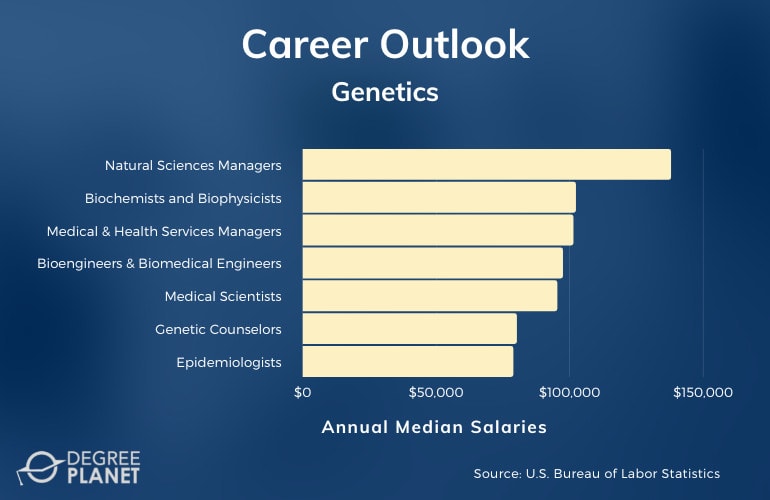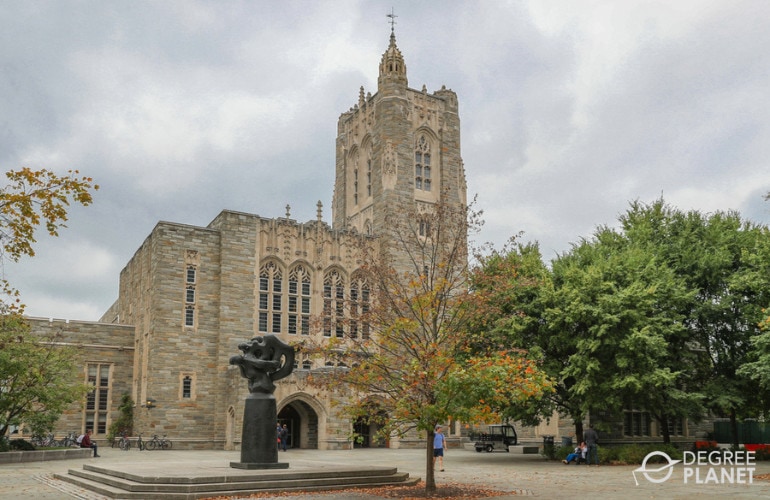Pursuing a masters in genetics online can provide you with the opportunity to build a solid understanding of prominent issues in genetics on an individual and community level.

This is a fitting degree to pursue if you have a background in biology or biochemistry. Not only can you leave your genetics program with an expertise in subject-specific knowledge, but you can also acquire many useful research tools.
Editorial Listing ShortCode:
If you are interested in working in a healthcare setting and having an impact on the well-being of patients, then an online masters in genetics program may be a rewarding path for you to consider.
Masters in Genetics Programs Online

The field of genetics is concerned with the exploration of genes and the concept of heredity, or the traits that are passed down through families. A master’s degree in genetics provides the opportunity to engage in advanced studies in the areas of human and molecular genetics.
Graduate programs in genetics are often used as a stepping stone on the road to becoming a researcher in the field. You can learn the necessary tools to conduct investigations and experiments in response to specific questions and inquiries.
Typically, advanced degrees in genetics cover course topics similar to those listed below:
- Gene structure and regulation
- Molecular basis of human genetic disease
- Genomics
- Population and statistical genetics
- Bioethics and research ethics
- Research
- Statistical methods
Over the course of your degree program, you can take coursework in areas spanning from cytogenetics and molecular genetics to genomics and epidemiology. Most programs also end with a capstone project, in which you showcase your research skills and acquired knowledge. A graduate degree in human genetics can help you qualify for a career in this growing field.
Editorial Listing ShortCode:
Advanced positions in this field include:
- Genetic counselors
- Medical scientists
- Biochemists and biophysicists
- Clinical laboratory technicians and specialists
- Research scientists
- Postsecondary teachers
Many of these professional positions involve working in laboratories or medical health centers, both public and private. This work could include helping families understand genetic risks that may be passed down to children and providing support through testing processes and diagnoses.
Many graduate students who study genetics are able to develop skills in:
- Scientific data analysis
- Communication, both verbal and written
- Problem-solving
- Time management
- Critical thinking
While genetics masters programs online generally prepare students for work in the industries of health or sciences, many of the skills developed in this online biology degree program can be applied to positions outside of these areas.
Genetics Careers & Salaries

People who work in genetics often contribute to revolutionary discoveries in the medical field, performing research, testing patients for genetic diseases, or developing new medications.
In addition to work within the medical field, there are also career opportunities in other industries, such as food science or education. According to the Bureau of Labor Statistics, professionals who graduate from a genetics masters program may go on to pursue one of the following roles related to this field.
| Careers | Annual Median Salaries |
| Natural Sciences Managers | $137,900 |
| Biochemists and Biophysicists | $102,270 |
| Medical and Health Services Managers | $101,340 |
| Bioengineers and Biomedical Engineers | $97,410 |
| Medical Scientists | $95,310 |
| Genetic Counselors | $80,150 |
| Epidemiologists | $78,830 |
| Junior College Teachers | $76,350 |
| Agricultural and Food Scientists | $74,160 |
| Clinical Laboratory Technologists and Technicians | $57,800 |
Many genetics graduates choose to use their skills and scientific knowledge to enter into medical sales or management. Some genetic career paths, such as medical scientist, require a PhD or medical degree.
Editorial Listing ShortCode:
Earning your advanced degree in genetics will not necessarily be the determining factor in your job search post-graduation. While it can help you qualify for roles in the field, employers will still evaluate your abilities through your application materials, resume, and interview.
Genetics Master’s Curriculum & Courses

An advanced degree in genetics will offer coursework that can provide you with a strong foundation in a wide variety of specialties within the field. You may come across some of the following courses during your studies:
- Gene Structure and Regulation: In this course, you’ll learn about gene technology and genetic analyses, studying topics like molecular structures and the genetic material in cells.
- Molecular Basis of Human Genetic Disease: This course explores how genetic mutations can cause disease in the human population.
- Genomics: This course takes a comprehensive look at the human genome, and you’ll explore concepts such as genome sequencing and genomic interrogations.
- Population and Statistical Genetics: This course uses quantitative genetic models to analyze the evolutionary process.
- Bioethics and Research Ethics: This class is an exploration of prominent ethical questions and dilemmas in the fields of medicine and biology.
- Research: You’ll have the opportunity to conduct research into a specific area of study.
- Statistical Methods: You’ll learn foundational statistical concepts, covering topics like regression analysis, probability distributions, and estimation.
- Clinical Genetics: In this class, you’ll learn how to relay scientific information regarding genomics and diagnoses to patients in a clinical setting.
- Genetic Literature Critical Analysis: You’ll learn how to read and analyze important contributing literature in the field of genetics.
- Applied Animal Genomics: This class is an exploration of genomic theory as it relates to livestock, covering topics like cloning, gene mapping, and transgenesis.
As with any master’s program, the exact course titles and subjects covered in your genetics curriculum will vary between schools.
MS in Genetics Admissions Requirements

While you will find some common requirements between master’s programs, each school will have a unique application.
Here are some typical admissions requirements you may come across:
- GRE or GMAT scores (only some schools require them)
- Official undergraduate transcripts
- Statement of intent
- Letters of recommendation
- Resume
What are colleges looking for in your application? They want to see information that makes you stand out as a candidate. This might include a stellar grade point average, previous experience in the field, or glowing letters of recommendation. It’s strategic to identify your strengths and then find a way to make them shine.
Genetics Graduate Programs Accreditation

An beneficial step in your college search is ensuring that your prospective schools are regionally accredited. The accreditation process is a chance for colleges and universities to prove that they offer valuable and worthwhile educational programs and facilities. Throughout the process, the accrediting agency evaluates faculty and staff and examines financial statements.
Editorial Listing ShortCode:
If you are wanting to apply for federal financial aid, it is necessary to attend an accredited institution. In addition, other higher education institutions and potential employers only recognize degrees as credible if they come from accredited schools.
Financial Aid and Scholarships

Are you worried by the costs that come with college applications, materials, and attendance? If so, researching available financial aid and scholarship opportunities could be a helpful next step.
There are many forms of financial aid. Some are granted by the government, such as federal aid and state aid, while scholarship programs are often offered by schools or outside organizations. You can find out how much federal aid you are eligible for by filling out the Free Application for Federal Student Aid (FAFSA). This form uses personal information, like income level and enrollment status, to determine the amount of aid you qualify for.
Most forms of financial aid, including federal, state, and scholarship programs, will require you to maintain a minimum grade point average.
Is Genetic Counseling a Good Career?

Yes, genetic counseling is a good career for many professionals. There are various benefits to working in this field, including:
- Above average median wage
- Ability to help others
- Job stability
- Opportunity to apply specialized skill sets
There are parts of the job that may be difficult for some, such as delivering hard news to ill patients or staying up to date on the latest research. Overall, though, many genetic counselors are able to impact the lives of the patients they work with, predicting the risk for disorders such as sickle cell anemia and cystic fibrosis.
What Can You Do with a Masters in Genetics?

There are many professional avenues available to those with their master’s in genetics. An advanced degree can even help you qualify for leadership positions within the world of healthcare and science.
Some graduates pursue roles as medical, health services, or natural sciences managers. Those who are drawn to education may use their knowledge to teach the next generation of genetics experts. Others go on to become epidemiologists or genetic counselors, using their skills to help communities tackle public health issues or to impact the lives of individual patients.
Is Genetics Hard?

Everyone learns and processes new information differently, so only you can determine whether the study of genetics will be particularly difficult for you. But what’s involved in the study of genetics?
A typical curriculum in the field covers topics like gene structure and regulation, population and statistical genetics, and bioethics. These courses often require strong analytical skills, the ability to make sense of complicated topics, and the capability to work as part of a team. If these skills and subjects sound interesting to you, chances are you may enjoy a master’s program in genetics.
How Long Does It Take to Get a Master’s Degree in Genetics Online?
The time it takes to earn a master’s degree in genetics online will vary between schools, depending on factors like personal schedules, preferences, and available learning formats and timelines. A typical master’s program takes 1 to 2 years to complete.
Editorial Listing ShortCode:
Programs that consist of 36 credit hours and don’t have a thesis requirement can often be completed in 1 year if you enroll full-time, including during summer term. If you only attend school part-time, you can expect additional time to be added to your program. Plus, if your program does have a thesis requirement, this can also push back your completion date.
What’s the Difference Between Genetics vs. Genomics?
Although genetics and genomics may sound similar, they refer to different fields and are not used interchangeably.
| Genetics | Genomics |
|
|
Genomics and genetics differ in their scope as well as the common career paths pursued by graduates of these programs. Genetics is a common field of study for genetic counselors and clinical research coordinators. On the other hand, genomics-related careers include genomics researcher and computational genomics and data scientist.
Is a Masters Degree in Genetics Worth It?

Yes, a masters degree in genetics is worth it for many students. Compared with all other occupations, the employment growth for careers in genetics is rising at a rate much faster than the national average, according to the Bureau of Labor Statistics. For example, employment of genetic counselors is projected to grow 26% over the next ten years.
Editorial Listing ShortCode:
Careers in genetics can also provide stable employment, often paired with excellent benefits packages and higher than average salaries. Available positions, benefits, and wages will of course depend on a number of factors, such as your employer, job title, previous experience, and geographic location.
Universities Offering Online Masters in Genetics Degree Program
Methodology: The following school list is in alphabetical order. To be included, a college or university must be regionally accredited and offer degree programs online or in a hybrid format.

Bay Path University’s MS in Genetic Counseling is available mostly online, with 2 or 3 day campus sessions held twice per year. Students in the program are also required to complete 800 hours of fieldwork, which they can completed at local clinical sites. The program includes 59 credits of coursework and is 21 months long.
Bay Path University is accredited by the New England Commission of Higher Education.

Boise State University offers a Master of Science in Genetic Counseling. The program is fully online, but students are given opportunities to interact virtually with teachers and classmates. It can typically be completed in 5 semesters of full-time study. The asynchronous format does provide some flexibility.
Boise State University is accredited by the Northwest Commission on Colleges and Universities.

Case Western Reserve University offers an MS in Genetic Counseling. The degree can typically be completed in 2 years. It includes courses such as Advanced Medical Genetics: Molecular and Cytogenetics, Psychosocial Issues in Genetic Counseling, Embryology, and more. A clinical practicum is also required.
Case Western Reserve University is accredited by the Higher Learning Commission.

George Washington University offers an MSHS in Molecular Diagnostic Science. The program is 35 total credits, and the average student finishes in 2 years. Coursework is fully online, with no campus visits required. Graduates of the program are eligible to take the ASCP Technologist in Molecular Biology Exam.
The George Washington University is accredited by the Middle States Association of Colleges and Schools.

Johns Hopkins University offers an MS in Individualized Genomics and Health. The program requires a total of 10 courses and can typically be completed in 1 to 2 years. The degree can be earned on campus or online. Three concentrations are available: Genomics, Laboratory Diagnostics, and Regulatory.
Johns Hopkins University is accredited by the Middle States Commission on Higher Education.

Manchester University offers an online program for a Master’s in Pharmacogenomics. The program requires the completion of 34 credits, and most classes are 7 weeks long. Students can typically finish the program in 2 years. Coursework includes Pharmacology, Human Genetics, Bioinformatics, Advanced Molecular Biology, Advanced Pharmacokinetics, Data Analysis/Biostatistics, and more.
Manchester University is accredited by the New England Commission of Higher Education.

Northern Michigan University offers an MS in Clinical Molecular Diagnostics with 3 tracks to choose from. Options are Clinical Molecular Diagnostics – Human Genetics Concentration, Clinical Molecular Diagnostics – Infectious Disease Concentration, and Clinical Molecular Laboratory Education. The program requires the completion of 33 credits and usually takes 5 semesters to complete.
Northern Michigan University is accredited by the Higher Learning Commission.

Saint Joseph’s University offers an online program for an MS in Genomics. It consists of twelve 8-week courses. Students usually take one class at a time and can typically finish in 2 years. Courses include Principles of Genetics, Chromosomes and Human Disease, and Evolutionary Analysis.
Saint Joseph’s University is accredited by the Middle States Commission on Higher Education.

Southern California University of Health Sciences offers an online program for a Master of Science in Human Genetics and Genomics. Full-time students can typically finish in 1 year, and part-time students can usually finish in 2 years. Classes can be started in the fall, spring, or summer. The program culminates with a capstone project.
SCUHS is accredited by the Western Association of Schools and Colleges.

The University of Florida offers an online program for a Master of Science in Microbiology and Cell Science with a concentration in Medical Microbiology and Biochemistry. The curriculum covers genomics and related fields. Students can potentially finish the degree in just 1 year. GRE scores are not required to apply.
The University of Florida is accredited by the Southern Association of Colleges and Schools Commission on Colleges.
Getting Your Masters in Genetics Online

If you have a passion for science and helping others as well as an analytical approach to problem-solving, you might consider pursuing a masters program in genetics.
Many genetics professionals have the opportunity to use their skills to work with families and patients in a range of settings. Some work in public hospitals, laboratories, and university medical centers. They can also help patients understand and process difficult information regarding genetic testing results.
You can begin your journey toward a career in genetics with a simple search for masters programs in genetics or online genetic counseling programs from accredited universities. The sooner you start exploring accredited online genetics courses leading to graduate degrees, the sooner you may find the program that best suits your goals.

